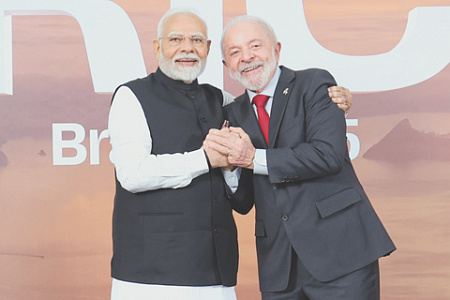
The BRICS summit in Rio de Janeiro concluded with a carefully crafted declaration that signals the bloc’s reluctance to engage in direct confrontation with the United States, even in the face of significant pressure. Перед finalization of the document, leaders of the emerging economies grappled with a threat from U.S. President Donald Trump to impose 10% tariffs on countries pursuing what he termed an “anti-American” BRICS policy. The resulting communique walked a fine diplomatic line, condemning protectionist Western tariffs in general terms but refraining from naming the U.S. directly, showcasing a clear effort by host nation Brazil and other members to de-escalate tensions.
The declaration obliquely criticized Washington’s economic policies by stating that rising tariffs violate World Trade Organization (WTO) rules, risk shrinking global trade, and disrupt supply chains. However, the absence of two of the bloc’s most influential figures, Chinese President Xi Jinping and Russian President Vladimir Putin, cast a long shadow over the summit’s ambitions. Putin’s absence was linked to an International Criminal Court arrest warrant, while Xi, who had attended every summit since 2012, was also not present, weakening the group’s projection of a united front.
On Middle Eastern conflicts, the BRICS nations issued a stronger, though still selective, condemnation. The final statement denounced recent attacks on Iran’s nuclear facilities as a violation of international law and called for an immediate ceasefire in Gaza. While these points implicitly criticized actions involving Israel and its U.S. ally, the document pointedly did not mention the United States. Speaking at the summit, Iranian Foreign Minister Abbas Araghchi was more direct, calling for the UN to hold both Israel and the U.S. accountable for international law violations and warning of regional consequences.
The bloc’s support for a two-state solution to the Israeli-Palestinian conflict, based on a Palestinian state with the West Bank and Gaza, was also complicated by Tehran. Following the summit, Araghchi posted on social media that his government had reservations, stating the idea “will not work in the future, just as it has not worked in the past.” Regarding the war in Ukraine, the declaration offered only a vague appeal for a peaceful resolution, while separately condemning attacks on civilian facilities in Russia’s Bryansk and other regions without assigning blame.
This cautious maneuvering led analysts to question the bloc’s current effectiveness. Alfredo Negre, a professor at the Catholic University of Brazil, commented that the summit failed to present a credible alternative to a volatile world order. “The absence of the President of Egypt, the uncertainty with the representation of countries like Saudi Arabia, the UAE, and Iran, showed that BRICS is not currently in a position to become one of the poles of global leadership,” he said.
Despite the challenges, the summit was not without positive developments for some members. Indian Prime Minister Narendra Modi’s attendance underscored his nation’s commitment, a significant factor as India is set to host the BRICS summit in 2026. Meanwhile, Brazilian President Luiz Inácio Lula da Silva used the platform to criticize NATO’s decision to increase military spending, remarking with irony that, “It is always easier to make investments in war than in peace,” a sentiment that found its way into the final declaration.
